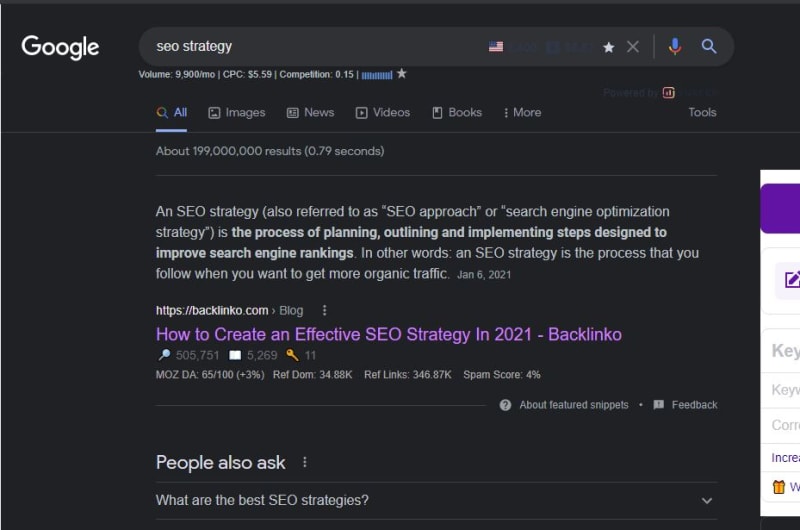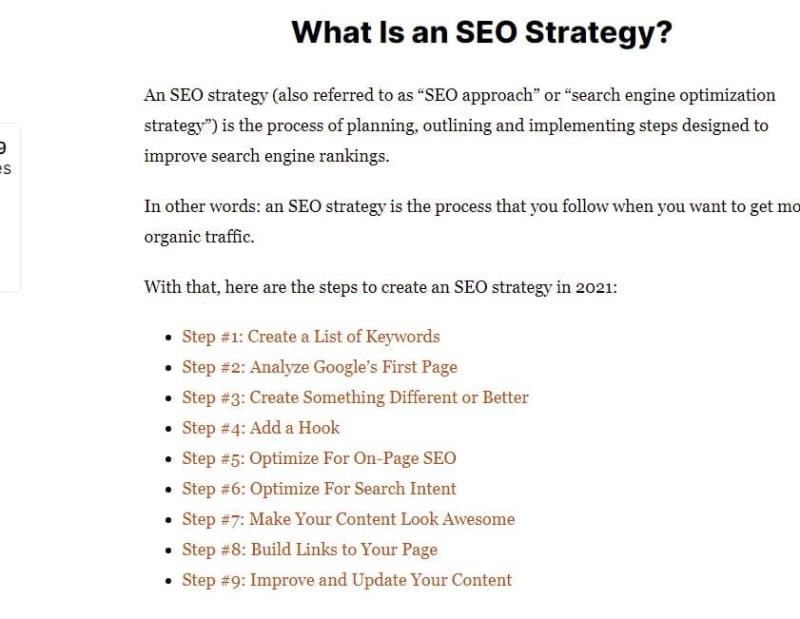Editorial Note: this post is part of my SEO for Non-Scumbags series, which I began here.
It might seem a bit aggressive or presumptuous to write off an entire discipline as tactical. But, I guess, here we are.
I've spent the last 4 years absolutely immersed in the world of SEO, largely with one simple goal in mind. I've wanted to make Hit Subscribe's clients happy by bringing well qualified traffic to their websites.
My effort has done two things:
- Worked
- Exposed me to enough digital content about SEO that the electrons in it probably add up to a metric ton.
And during all of that time, I can't recall ever seeing anything that actually rises to the level of strategy. The entire SEO world just seems to be a person blundering into a tactic that works through trial and error, doubling (tripling, hundred-ing) down on it and taking advantage of a brief arbitrage before the entire rest of the field rotely copies the tactic. Then, repeat.
An SEO "Strategy" Case Study
To see what I mean, let's get just insanely meta and do a google search for SEO strategy. At the time of writing, well respected SEO expert Brian Dean ranks number one with this article. One would expect that the SEO guy who can out-SEO all other SEO guys and rank for "SEO strategy" must be some kind of God of strategy.
Now, let's roll up our sleeves and get ready to bask in the Sun Tzu-esque wisdom no doubt to follow. Er, after I click out of a modal pop-up, that is.
(As an aside, to any smartass about to suggest the Art of War is a series of tactics, I'd say it's a series of philosophies and heuristics.)
Excellent! Nine, easily repeatable, paint-by-numbers steps to follow that will result in even you, dear reader, with little prior knowledge of the topic, having a strategy (a synonym for which is, apparently, "approach").
Now, before we dive into multifaceted irony of the pinnacle of SEO strategy being a thing everyone reading can easily repeat, I want to be very clear about something.
Brian Dean is really, really good at SEO. Full stop.
Ranking in the first position for "SEO strategy" is no small feat, and he's pulled it off. I doubt that I could pull that off, myself.
But I also couldn't pull off eating 15 cheeseburgers in one sitting. And that gluttonous activity also isn't a strategy -- it's just an impressive feat, for some definition of "impressive."
The Obligatory What Are Strategy and Tactics Section
I don't want to belabor this point too much or be too pedantic about it. If you want to chase this rabbit all the way down its hole, Jonathan Stark has talked a lot about it, including here, here, and here.
In fact, let's start with Jonathan's definition, which I like.
Strategy is a concise, high-level approach to achieving an objective by playing strengths against weaknesses in an unexpected way.
Emphasis mine. And taking the bolded alone, the absolute pinnacle of "SEO strategy" is, on its face, not strategy. In fact, here's how I'd describe Brian Dean's post, instead:
[SEO] Strategy is a verbose, granular approach to achieving an objective by playing strength against strength in highly formulaic way.
Jonathan's definition is great, but I want to elaborate on it a bit and adapt it in a more heuristic and corporate way, to illustrate my point in this post. That is to say, don't take my definition as a good one -- just a contextual one.
Some titan of org theory, whose name escapes me and my Google-fu at the moment, talked about strategy as a means of dealing with the unprecedented and unknown. Your over-arching strategy can have a series of sub-strategies, and so on down the line. But sooner or later, sub-strategies simply turn into tactics.
At what point does this happen, exactly?
Well, at the point where the tactics are simply best practices, so to speak. For instance, my "typing strategy" as I write this post, doesn't court the unknown or unprecedented in any meaningful way. It's just "one hand each on home row, and let 'er rip." I have no strategy because I'm simply executing a well-defined, battle-tested process -- a tactic.
Rolling this up to strategy in the corporate world, the heuristic I like to use for distinguishing strategy from tactics is to prepend whatever we're talking about with "unlike anyone before us..." So let's look at a couple of examples to see how this plays out.
- Jeff Bezos: unlike anyone before us, we're going to sell books on this newfangled internet thing.
- Brian Dean: unlike anyone before you (except the other tens of thousands of people reading this article), here's what you do.
SEO Strategy Isn't Strategy -- So What?
As I've said and in complete seriousness, Brian Dean is really, really good at SEO. I might go so far as to say that he's a master tactician.
But this brings us to the core problem of treating tactics as strategy. When a master tactician balls up his tactics and teaches them to you, he's giving you a blueprint for always coming in second, behind him. Oh, and, also behind the many, many other master tacticians in the space.
Recall that my purpose in writing this series is to teach Hit Subscribe's technical account strategists (engineers that are maybe, passingly interested in SEO) how to design content campaigns that bring lots of visitors to client sites. I am nowhere near enough of a master SEO tactician to beat out Brian Dean and all those people. Heck, I probably don't even know half of the tactics in one of the ubiqitous, granular 8 billion SEO tips, like this one.
If I haven't bothered to learn all of these granular (frankly, waste of time, if I'm being honest) tactics, there's no way I'm going to teach them to someone.
So what can we do instead of playing our weakness against the master tacticians' strength?
We can [play our] strengths against [their] weaknesses in an unexpected way.
In other words, we can form a strategy.
And that strategy, from one engineer to another, is pretty simple to articulate. We figure out who our clients want on their sites, signing up for their betas or downloading their trials, and then we answer questions that those people ask and that nobody else is answering.
Our strength (their weakness) is that neither Brian Dean nor any other SEO consultant will know that a search for "test environment" and a search for "testing environment" aren't the same thing. As software engineers, we haven't mastered the finer points of Twitter cards or site schema (mostly because it's not worth the bother), but we do know that "c# array" isn't a good search to target if you're looking to sell to advanced .NET developers.
But it's more than just that. It's more than just having an engineer's knowledge -- it's having knowledge of cost, return on investment, expected value calculations, and game theory.
Interlude: Explaining Game Theory Like You're 5 (Okay, Maybe 15)
During my computer science undergrad (and grad) degree, I took a series of discrete math courses, some of which touched on the idea of game theory.
As I recall, the most iconic example of game theory is the so-called prisoner's dilemma. And that's easy to understand.
Imagine that you commit a crime with an accomplice, and you're both caught. The police offer each of you a deal, and this creates the following possible outcomes.What should you do?
- Both of you stay silent, and the police throw you each in jail for 1 year.
- You snitch and your accomplice stays silent, resulting in you going free and that person going to jail for 3 years.
- You stay silent and your opponent snitches, which puts you in jail for 3 years while the accomplice goes free.
- Both you and the accomplice snitch and do 2 years.
This problem, and problems like it, are interesting because your actions depend on your goal and some unknowns (to you). Is your goal to take a moonshot to maximize your upside? Minimize your downside? Optimize for the expected outcome?
Let's work this out in terms of expected value for each thing you could do.
- If you snitch, there's a 50% chance you go free and a 50% chance you go to jail for 2 years, which means the expected value of your jail sentence is 0.5 * 0 + 0.5 * 2 = 1 year.
- If you stay quiet, there's a 50% chance you go to jail for 1 year and a 50% chance you go to jail for 3 years, which means the expected value of your sentence is 0.5 * 1 + 0.5 * 3 = 1.5 years.
So the most rational course of action is to snitch. And that's true even though both of you cooperating would mean a better outcome than both of you snitching. That last part is kind of a mind-bender.
Game theory is, loosely speaking, the study of this style of decision-making theory.
(Loosely) Applying Game Theory to SEO
Let's say that you've built and are selling a headless CMS. You and many others. As soon as you start to look at SEO, something will occur to you:
I should rank for "headless CMS!"
This is what I personally call a "yellow pages SEO play." For those of you old enough to remember phone books, this is akin to paying to be the first plumber that shows up in the phone book when someone flips to the "P" section, looking for plumbers.
I'm going to leave aside the commodifying effect of this approach as an advanced topic for this course, and instead focus on another challenge with this approach: every other headless CMS also has this same idea. And one of them might have just retained Brian Dean to help them pummel you into SEO submission.
You're probably never going to rank for this keyword.
But, if you hire an SEO firm and invite them to give you recommendations where they spend with your wallet, they're going to urge you to try.
"Just write a 50 billion word pillar post, buy 600 links for $3K each, commission 14 infographics, execute this 500 point SEO optimization checklist and send a candygram to Google, and you can site astride that SERP like a colossus of inefficient spending!"
In all seriousness, trying to out-muscle your competitors for a yellow pages keyword is really expensive. And it might not work. And that's all to position yourself to have maybe a 4% lead qualification rate of all of the people who execute that search and click through to your page.
So thinking back to the prisoner's dilemma, let's ask ourselves something.
If you have to spend $20K on content and link-building to occupy that spot, which is better?
- Spend $20K for 1 piece of content that brings you 10K visitors per month and qualifies 4% (400) of them?
- Or spend $20K for 20 pieces of content, each of which bring 10K visitors per month, qualifying 1% (2,000) of the total?
The answer is clear. And the strategy lies in knowing the audience segment (engineers) well enough to understand three things:
- Which non-yellow-page searches will still yield a pretty decent conversion rate by qualifying the audience well?
- Of those searches, which are non-competitive enough to yield good traffic for the client?
- And, of those searches, which will tee up visitors to enter a nurture sequence.
Others don't know to do this because, by enlisting engineers and not SEOs to plan, we are (say it with me) playing strengths against weaknesses in an unexpected way.
Wrapping Up Until Next Time: What Marketing Really Is
Now, at this point, you're probably thinking, "Erik, you terrible writer, you just introduced a term (nurture sequence) with no preamble or definition." And to that I say, "I will concede that I may be a terrible writer, but I actually did that on purpose. It's a literary device! (Or, something, I think...)"
The reason I did this is because that dangling tidbit provides an excellent segue for the rest of the series.
To understand a nurture sequence is to understand the core of digital marketing, so let's look at that in a bit of detail. And let's do it by considering how the "yellow pages search" is actually, in a vacuum, a remedial form of digital marketing.
The Idealized vs Real Path to Becoming a Lead
Many people (including me, for years), think of digital marketing as this sequence of events: get someone's attention, show them some content, get them to buy/sign-up/whatever. In other words, the purpose of content on your site is to, in one fell swoop (blog post), take them from "I've never heard of this company" to "I like the cut of your jib and would like to do business with you." And the yellow page search reinforces this idea -- the idea that leads come into your sales funnel this way:
- Google "headless CMS."
- Read your blog post defining "headless CMS"
- Give you money.
But, it turns out that this rarely, if ever, happens, depending on your offering. And, even if it does, it'll represent only the tiniest fraction of how people become your customers after encountering your website.
Rather than googling headless CMS, reading about what it is, then buying it, your eventual customers are much more likely to do this:
- Stumble across your site by accident somehow, pay no attention to who you are.
- Four months later, land on your site googling something like "jamstack tutorial" and think, "huh, I feel like I've seen this site before" right before closing the tab and thinking no more of you.
- A few weeks later landing on your site a third time, from a link elsewhere, and actually remembering your brand name.
- Seeing some remarketing you're doing on social media about a headless CMS, and thinking "what's a headless CMS"?
- Googling "headless CMS," landing on someone else's site, and learning what that is.
- Stumbling across another of your articles through Google and thinking, "this company seems helpful -- I keep winding up back here."
- 6 months later, after changing jobs, they're at a new employer, thinking, "huh, maybe we could use a headless CMS here."
- They kinda remember you, google "headless CMS" and don't actually see you, so they pivot to googling "headless CMS companies" looking for round-up articles.
- There you are! You're the 5th out of 13 entries, so they click through to your site, fill out a form asking for a demo, and become a qualified lead.
Digital Marketing is Deceptively Simple
That whole process that I've just outlined is (an admittedly immature version of) lead nurture. There are two critical moments that lead to someone becoming a customer of yours: the moment they first become aware of you by landing on your site and the moment they give you their contact information and express interest in your offering.
And those moments almost never occur together. For a deep dive on this, you can check out this post I've written.
So here's the real, sequential essence of digital marketing:
- Grab their attention somehow, getting them to your website.
- Nurture them. Meaning, hold their attention and keep your brand in their mind, until they're ready to become a lead on their own terms. Nurture can happen via email list, joining a community, remarketing to them, having them subscribe via RSS -- whatever.
- Earn enough of their trust that they take the next step in becoming a customer.
Whew, alright. So why am I talking about all of that to close out a post in a lengthy series about SEO? Where does SEO even fit in?
Well, all SEO really does for you (except a few more advanced corner cases) is number (1). SEO helps you get their attention, usually for the first time.
This means that SEO, itself, is simply a tactic for getting people's attention. Through that same vein of thinking, "SEO strategy" is actually kinda nonsense, since SEO in a vacuum (just getting people's attention) is useless. Without understanding how you're going to nurture people to sign up, SEO becomes completely pointless, because you don't know who you want on your website and what kind of search indicates that you're getting the right person on your site.
And that's where I want to leave things. Because next up, we're going to talk about searcher psychology -- understanding how people use the search engine, and what you can learn from the searches they execute.
That learning -- that searcher psychology -- is how Hit Subscribe wins over and over again at SEO, using a game theory approach. We don't chase yellow pages searches and we certainly don't obsess over hundreds of SEO micro-tips, trying to earn any tiny edge. (Our QA staff at Hit Subscribe does execute an SEO sanity check, so we don't ignore it, but these things matter at the margins and not the core).
Rather, we leverage our deep understanding of the people we're trying to reach to understand the pains they're trying to solve with their searches. Then we earn their trust by helping them alleviate those pains.
We figure out what questions they're asking and answer those questions in a way that SEO firms and marketers couldn't possibly emulate. We play strength against weakness in an unexpected way.












Top comments (1)
Great breakdown of the difference between tactics and strategy in SEO. It's important to focus on understanding your audience and their needs in order to create a successful SEO campaign. Looking forward to the next post on searcher psychology. Gonna share it on my plumberseohub.com/ blog. Thanks for the informative read!